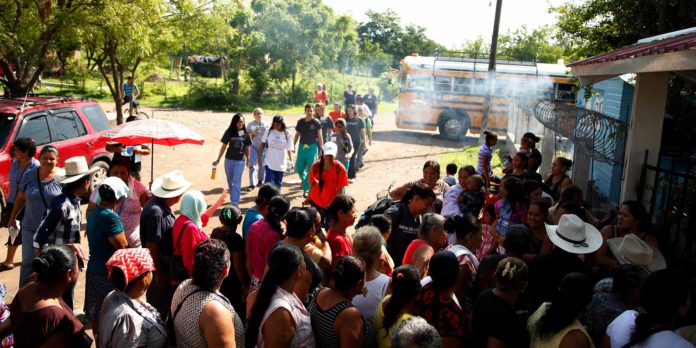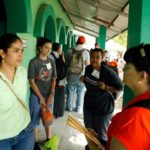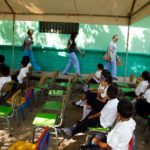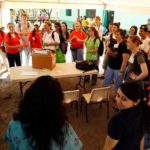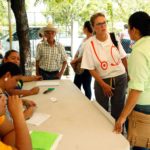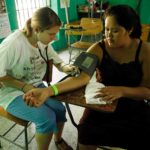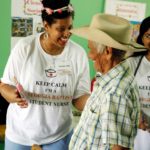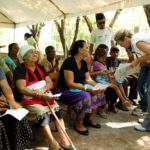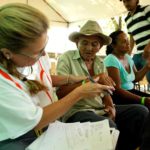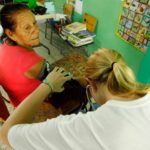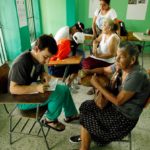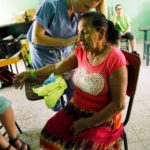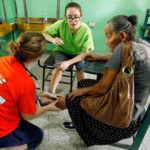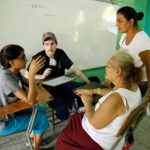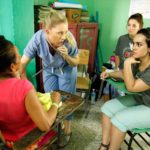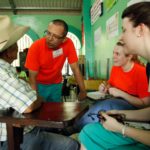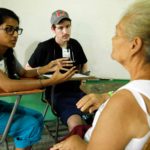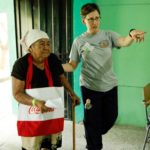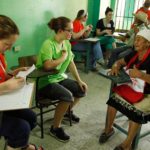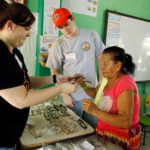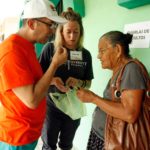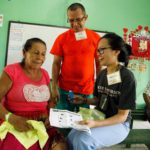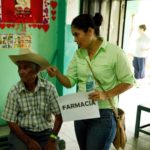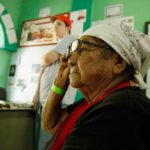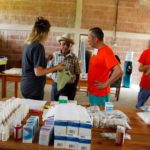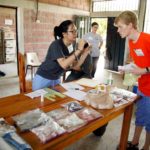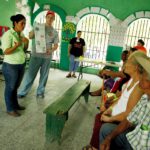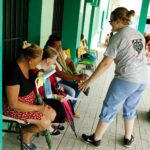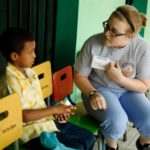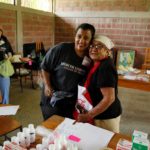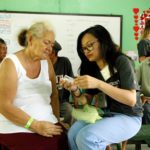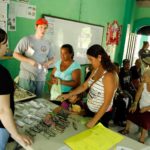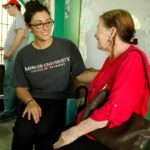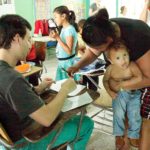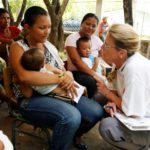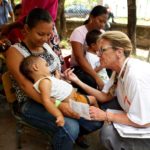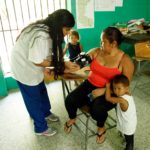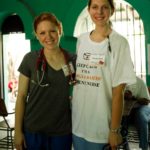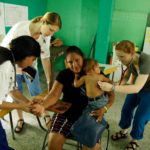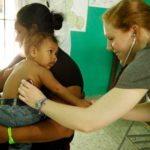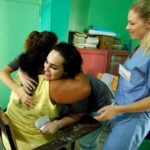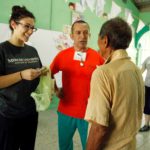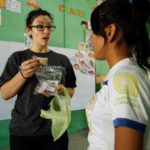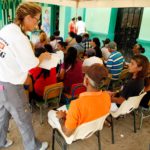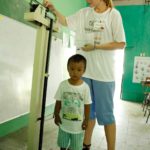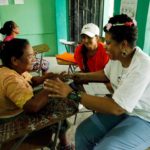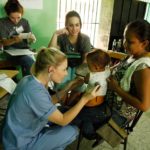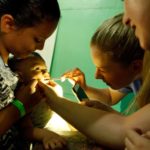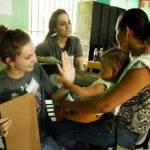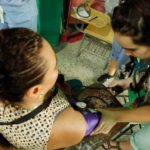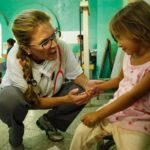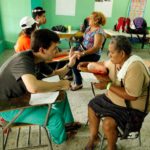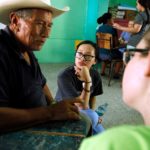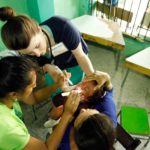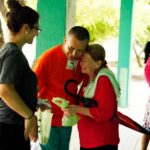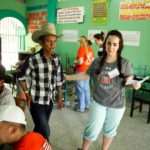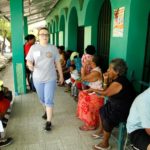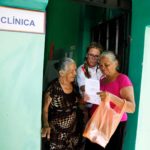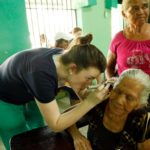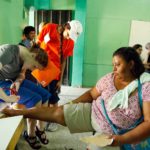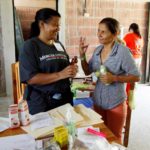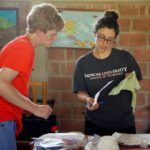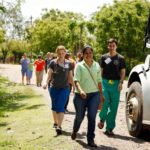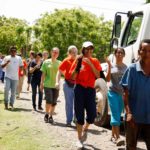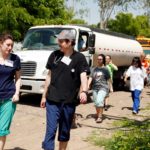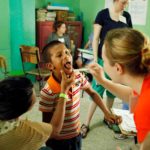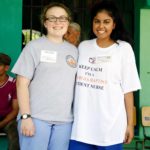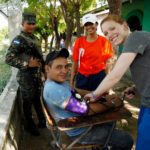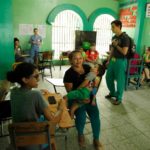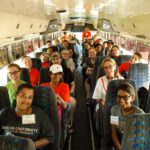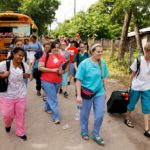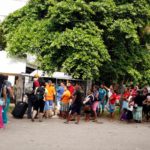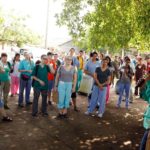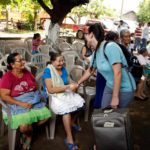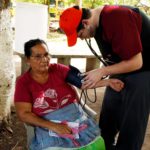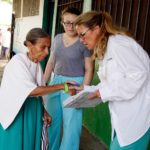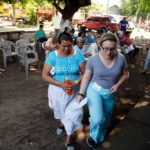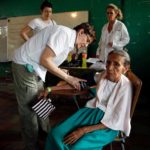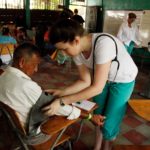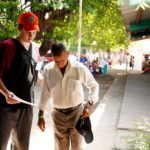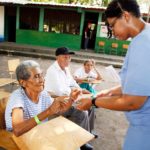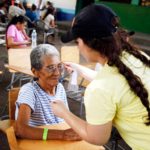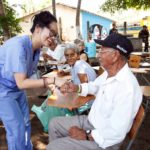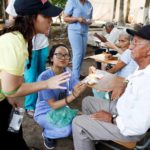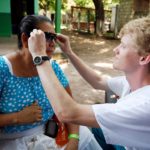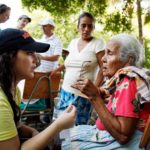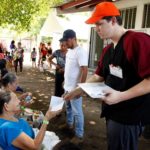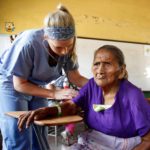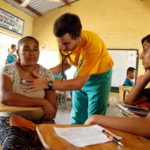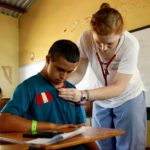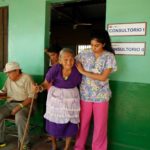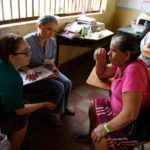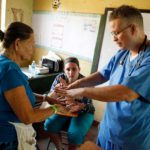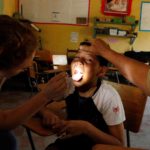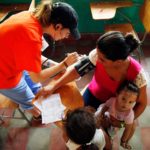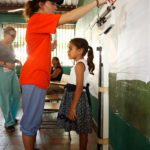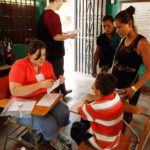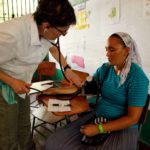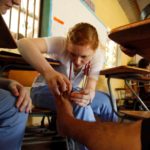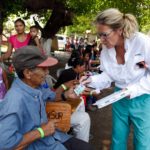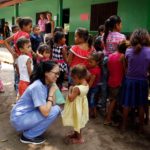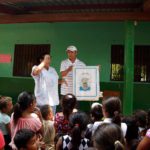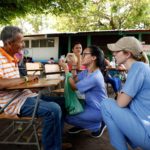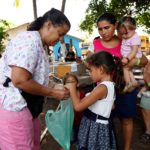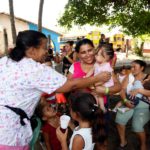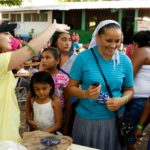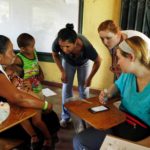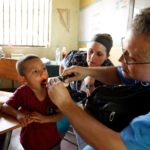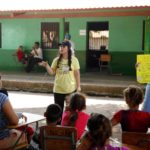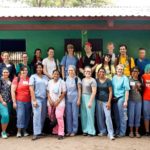By Steve Murray
He’d only been Mercer’s University minister and dean of chapel for a year when Craig McMahan, Ph.D., received an ambitious directive from his newly arrived boss. In March 2006, then-President-elect William D. Underwood instructed him to create a summer program allowing Mercer students to travel abroad for study and service projects.
“I said, ‘That’s a good idea — I’ll give it my best shot,’” Dr. McMahan recalled with a laugh. “And he said, ‘I don’t want your ‘best shot.’ I want you to do this.’”
Mercer On Mission (MOM) launched in June 2007 when 38 students and six faculty members traveled to Kenya to hand out 5,000 mosquito repellent-laced bed nets and work with at-risk children in a Guatemalan orphanage and in the favelas of Rio de Janeiro.
Marking its 12th year this coming summer, MOM has grown exponentially, with 227 students involved in 2017. Mercer hopes that number will eventually reach 450 students with an additional 80 faculty participating each year.
Mercer On Mission’s most high-profile work may be its prosthetic program in Vietnam, begun in 2009 and administered by biomedical engineering professor Ha Van Vo, M.D., Ph.D., DPM, and students from the School of Engineering. Additional MOM programs have allowed students and faculty the opportunity to serve others in Peru, Honduras, Cambodia, India and Greece.

The four units of the Mercer Health Sciences Center have become an increasingly important part of the MOM profile. Every summer, a mix of undergraduate, graduate and professional students, faculty and interpreters spend weeks overseas, setting up clinics in remote villages, treating the local people, filling prescriptions and teaching proper health practices.
That may sound scenic, but the core of each mission is service, which includes a lot of hard work. The missions are eye-opening experiences for students and faculty addressing health challenges in the field and reaching needy, underserved communities. Sometimes, when dealing with short-term ailments and providing health education, the students come face to face with diseases, like cancer and microcephaly in infants caused by the Zika virus, that can often go untreated due to a lack of resources in the area. The inspirational and the heartbreaking can be inextricably entwined in a day’s work.
“We’re laying the foundation for medical healthcare practitioners who are not only clinically skilled, but are emotionally, psychologically and spiritually inspired to care about human beings.”
“What’s gratifying to me are the extremes you see in situations like this, which offer the opportunity for growth that our students almost always seize and benefit from,” Dr. McMahan said. “We’re laying the foundation for medical healthcare practitioners who are not only clinically skilled, but are emotionally, psychologically and spiritually inspired to care about human beings.”
Brad Lian, Ph.D., associate professor of community medicine in the School of Medicine and associate professor of public health in the College of Health Professions, discovered the hard way how rigorous a Mercer On Mission trip can be. He’d gone once already to Ecuador, and on his second trip, to Honduras, he broke his hip in a freak accident. Until then, though, the daily routine was well established. Following a 45-minute bus ride from their lodgings, the interdisciplinary team would set up shop in schools or small community centers where they would make community health assessments and treat ailments.

“All the students have great hearts, and they go with the idea of making an impact on the area we’re going to,” Dr. Lian said. “But when they come back they say, ‘You know, the people we dealt with impacted my life more than I impacted theirs.’”
Jean Sumner, M.D., dean of the School of Medicine, thinks it’s vital that students in the Health Sciences Center see healthcare issues in multiple, hands-on environments, including internationally.
“It gives them a perspective on how wonderful the opportunities we have in this country are, compared to some other countries, and the opportunity that we have to serve others,” she said. “It opens their eyes to the needs of their own community and expands their horizons. They can take the learning and opportunities they had internationally and bring them back and apply them locally.”
As a doctor who has practiced in very poor, rural parts of Georgia during her career, Dr. Sumner is considering making it a prerequisite for any medical student who wants to participate in Mercer On Mission to first spend time practicing their skills in underserved areas of the state that, in some ways, resemble the hardscrabble hamlets of foreign countries.
Dr. Sumner thinks MOM is a program that truly distinguishes Mercer: “It separates us from other universities in that we’re committed to service first and foremost.”
Alice Aumann House, M.D., senior associate dean and professor of family medicine, traveled to Honduras last summer with an interdisciplinary team of 26 students and eight faculty who treated more than 2,700 patients, dispensed more than 3,000 prescriptions and logged nearly 2,000 service hours. This was MOM’s fifth trip overall to Honduras and second to the southern region of the country.
At primary care clinics throughout the Department of Choluteca, students rotated through an intake/vital sign station, provider station, education station and pharmacy station allowing them to experience and understand the various workings of each profession in a clinic setting. Additionally, a team from the Master of Family Therapy program in the School of Medicine provided psychoeducation and family therapy clinics.
“This system demonstrates to students by hands-on performance how crucial each profession is to the overall success of the clinic. Each student helped teach others aspects of their specialty,” said Dr. House. “There is no question that the attitudes and perceptions of our students were impacted by their Mercer On Mission experience in Honduras.”

Long before College of Pharmacy students and faculty flew to Honduras, they looked at the population they would be serving. The residents of rural, poor villages, far outside the capital of Tegucigalpa didn’t have electricity — thus no refrigeration for medications — and often no clean water. People frequently had intestinal worms.
So the students and Gina Ryan, Pharm.D., associate dean and clinical professor of pharmacy practice, put together a formulary list of antibiotics, anti-parasitics, non-narcotic pain medication, and drugs for hypertension and diabetes. Still, with all the medications they took with them, the team found pharmacy challenging.
“In the United States, we are used to having almost every drug at an arm’s reach,” said Dr. Ryan. “I think the team was surprised by a much different reality. But the medical students worked together with the pharmacy students to collaborate on what drugs were available and would work given the patient’s condition. They had a lot of conversations on what they could use of what we had.”
“But that’s the challenge of mission work. Students get to see how other people live and look at the world through a different lens.”
But not all health conditions could be easily solved, like the day the team encountered a child with terminal leukemia. “I think all of us cried about something at some point in the trip,” she said. “But that’s the challenge of mission work. Students get to see how other people live and look at the world through a different lens.”
The pharmacy team also trained with the nursing students in the triage area and vice versa. The student pharmacists showed how and why a pharmacy is set up by therapeutic areas and that some medications were relabeled to avoid errors caused by similar markings.
While the teams learned more about each other’s roles on the healthcare team, the students and faculty readily agree that providing care in an underserved area is the best reward, Dr. Ryan said. “We left knowing we had a positive impact on people’s lives, short-term and long-term, with something as simple as an antibiotic.”

For fun, Cathleen Provins-Churbock, Ph.D., assistant professor in the College of Nursing, scuba dives to depths of 100 feet below sea level, jumps 10,000 feet out of airplanes and skis black diamond runs. Even so, she found herself challenged in rural Honduras.
“I work emergency medicine, so I see people daily who are uninsured or underserved and not able to get the care they need,” she said. “But when you go to a country like Honduras, you realize we really have little to complain about.”
On a typical day, she and students would triage the patients — some of whom walked as far as 20 miles to attend the clinic — by taking vital signs, obtaining medical history and doing other things for which the profession is known. They helped the weak, held hands of the scared and played ball with children as patients waited sometimes hours to be seen by the “Americans.” “As nurses, our foundation comes from within — it is the caring, the compassion and the desire to help that makes us who we are.
“In America, someone may say I ‘need’ a new car, a new iPhone or a new pair of reading glasses,” said Dr. Provins-Churbock. “Seeing a child with worm infestation because they do not have a safe water source gives ‘need’ an entirely new meaning. Having a young mother ask you how to prevent her unborn child from being like this — as she holds a child with microcephaly in an area where Zika is epidemic — gives ‘need’ a new meaning.”
Such experiences change young healthcare professionals and instill a sense of community that truly comes from the heart. And, yes, some days in Honduras were difficult. Students were tired, hungry and even ill. But that didn’t stop them. “This is who we are,” Dr. Provins-Churbock said. “This is what we do. We take care of people. We take care of each other.”

Also on that interdisciplinary trip to Honduras, Mary Mathis, DrPH, assistant professor of practice in the College of Health Professions and coordinator of the Bachelor of Science in Public Health program, took two undergraduate public health students on MOM for the first time since the BSPH program began in 2015. “They learned how to apply in real life what they learned in the classroom. You are not there for just a half-hour. You are living it, so there’s no avoiding learning the lessons.”
They traveled to rural health clinics, provided education about diabetes and dental hygiene and nutrition, and also did a population health assessment that will help inform MOM trips to the area in the future. The daily interaction with patients sparked students to think about bigger, long-term goals for the community.
One challenge the local residents faced was access to clean water. “The river that goes through Honduras literally collects all the waste from everybody until it lands at the very end of the country, which was where these people lived,” she said. “So the students got really interested in working out a project for the future that would help the people filter their water.”
While it has not yet been involved with Mercer On Mission, the Department of Physician Assistant Studies has participated in service since 2014 with Global Health Outreach (GHO), an organization working with the Christian Medical Dental Association.
“This became a yearly event for students to volunteer for medical missions during their breaks between semesters,” said Jill Mattingly, DHSc, MMSc, PA-C, chair and clinical assistant professor, who coordinates and participates in these efforts. “For the last three years, we’ve gone to three different locations in Nicaragua with GHO.”
Students work in teams with a physician and physician assistant or nurse practitioner. “The students get so much exposure to patient care and spend lots of time doing histories, physicals and treatment with the providers and the preceptors. It’s extremely beneficial for them.”

Dr. Mattingly also collaborated with the College of Pharmacy to send PA students to Madagascar in the fall of 2016 and 2017 with the organization Medical Mission Teams.
She’s also exploring the possibility of sending students to Kosovo, whose health ministry has been seeking U.S. teams to help with a refugee clinic, as well as to Haiti and Puerto Rico.
In the future, Dr. Mattingly intends for the PA program to take part in Mercer On Mission. “Working in interprofessional teams seems to be one of the most beneficial activities that happens on these mission trips. Students have not necessarily come from backgrounds where they’ve worked with other professions, and this is a concentrated time where they can really share with each other and form friendships and even become future colleagues. I feel it’s extremely beneficial for us to be involved with Mercer On Mission.
“For the students, the benefit of these trips goes deep into their DNA,” she added. “As they’re becoming a provider, it reinforces that what their future holds is a daily thought about ‘How do I give back to my community, my region, my nation and my world?’”
That sense of service, she believes, goes to the heart of what Mercer University is all about. She’s even created a social media hashtag for use among her PA students — #MercerServes.
“That’s who we are. We’re all #MercerServes. That’s our core value.”

